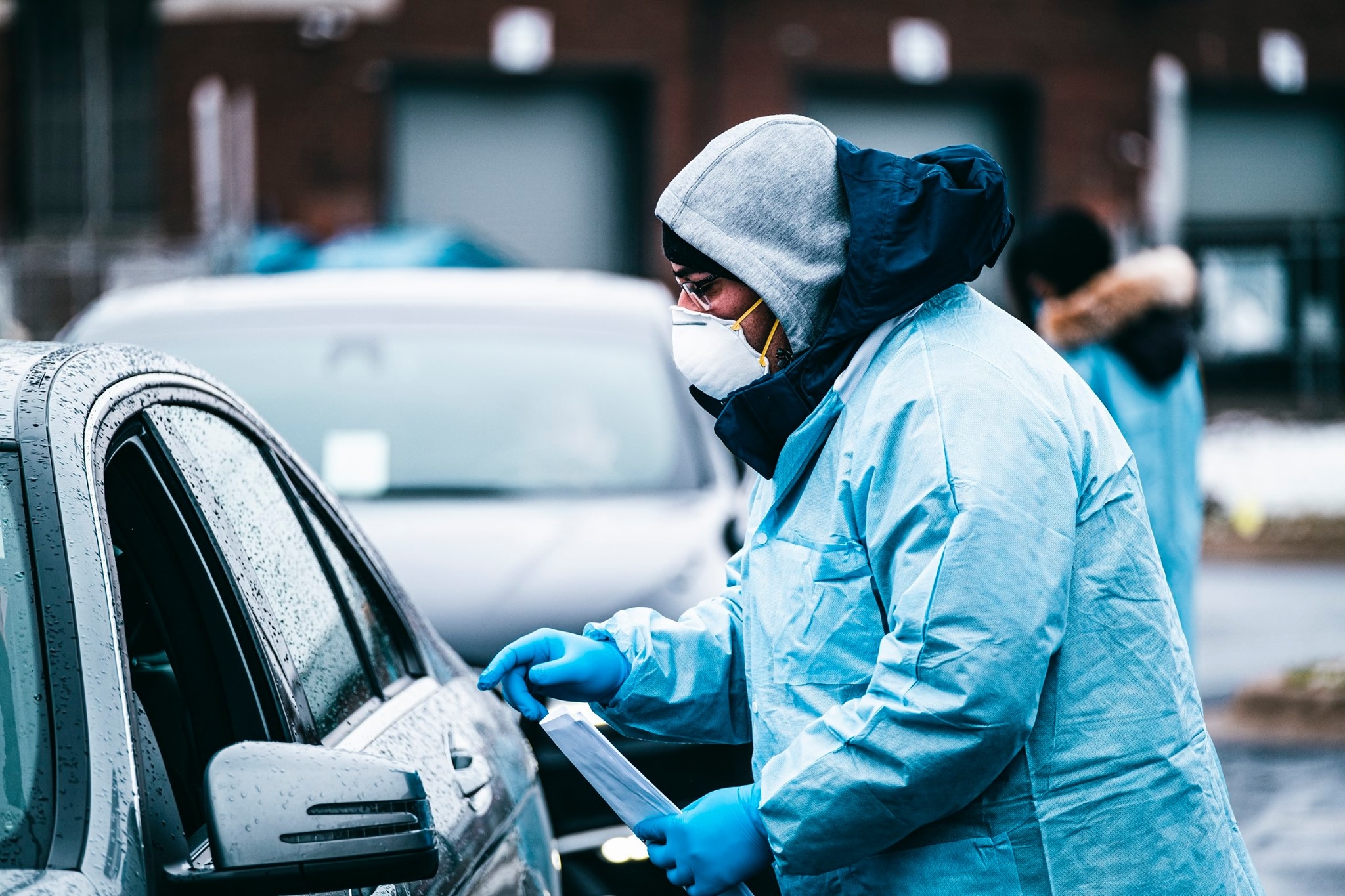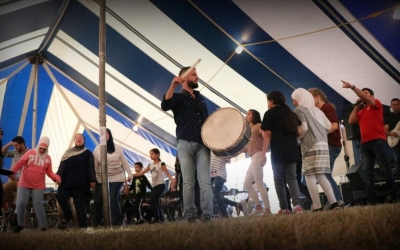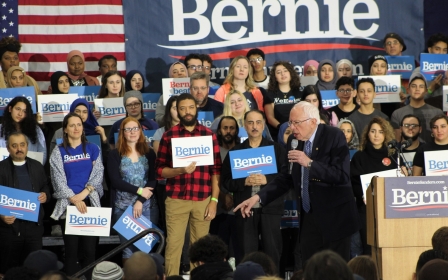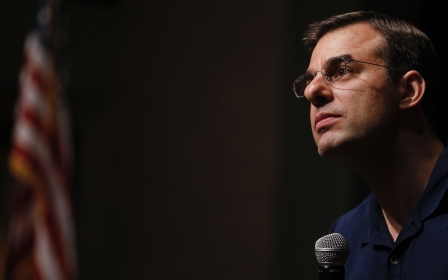Coronavirus: How Michigan's Arab Americans are responding to Covid-19

Officials, activists and organisations in Michigan are coming together to convey accurate information and provide services to the large Arab-American community in the state amid the coronavirus outbreak.
In Dearborn, the city known as the capital of Arab America, elected representatives and community groups are stressing - in Arabic and English - the need to observe social distancing guidelines as Covid-19 spreads at an alarming rate in and around Detroit.
With Michigan, where the death toll is nearing 2,000, emerging as one of the hardest hit US states, activists are urging people to follow the emergency rules imposed by Governor Gretchen Whitmer.
Amad Elzayat, founder of the Amity Foundation charitable organisation, said Arab Americans originally took the pandemic lightly, until it began to hit close to home.
"When you hear about people from our community dying, it becomes a reality check," Elzayat said.
New MEE newsletter: Jerusalem Dispatch
Sign up to get the latest insights and analysis on Israel-Palestine, alongside Turkey Unpacked and other MEE newsletters
Awareness campaigns
The messaging application WhatsApp, a favourite communication method in Dearborn's Arab community, is being used as the major medium for sharing material about the novel virus.
"People may not read or write English, but they know their WhatsApp, and those WhatsApp videos, they get around," Elzayat said.
Dearborn School Board member Adel Mozip has been translating and sharing credible information about the pandemic both in Arabic and English on social media. He is also working with State Representative Abdullah Hammoud to translate the information that the legislator's office is releasing daily.
"People do understand English; they speak English," Mozip told MEE. "But in the native tongue, information is more powerful. It gets there faster and people tend to use it more often."
Sam Baydoun, a Wayne County commissioner who represents Dearborn, is also translating news releases and posting informational material in both languages.
"I had to take on this role. I'm translating as much as I can," Baydoun told Middle East Eye.
The commissioner has also been sharing videos and statements on WhatsApp and social media with a simple and firm message: Stay home.
"We must listen to the instructions of the governor and stay at home," he said in an Arabic video message released last week.
"Here is Southeast Michigan and especially in Wayne County, the number of cases has increased drastically… We have to do our part as an Arab community, as we are a part of America's social fabric, to contribute to halting the spread of this deadly virus."

In a phone interview, Baydoun told MEE that while the Arab-American community is social and communal, the calls for social distancing are resonating well.
"My objective is to get the message out to all the Arab-American community, including and especially those who are not fluent in English and may not know the magnitude of this problem that we're facing," Baydoun told MEE.
"So I'm stressing to them: These are the measures that we should follow; these are the CDC guidelines; these are the executive orders issued by the governor of the state of Michigan, and this is what you need to do in order to stay safe."
Baydoun said people owe it to the health-care workers to follow the social distancing rules.
"We cannot take things lightly. We cannot gather in the garages and smoke hookahs and play cards," he added.
Social community
Many Arab households in Dearborn have converted their garages into makeshift socialising spaces for late night get-togethers and games.
Activists and officials have been warning against such gatherings, pleading with community members to follow the stay-at-home orders.
"Stay home as much as you can, unless you're going for an essential run... This means you cannot hang out with other family members who you do not live with. You cannot go hang out in the garage or on the front porch or take walks together, even if you are applying safe social distancing measures," Hammoud, the state representative, said in a webcast with Emgage, a Muslim-American advocacy group.
Such advice is sometimes difficult to follow in a community with strong familial and social bonds.
Mozip, the school board member, acknowledged that it is tough for people to maintain social distancing, which goes against their usual norms of being around family and friends.
"We're very social in our nature," he told MEE. The overwhelming majority of people are aware of the severity of the situation and adhering to the rules, he added, but there remains a small minority in a "bubble" that is "ruining it" for everyone else.
Mozip welcomed efforts by police to enforce the guidelines by imposing fines on violators. The state's executive order allows local authorities to issue up to $1,000 fines for violations of social distancing.
'Challenging times'
Lina Hourani-Harajli, the chief operating officer of ACCESS, a Dearborn-based community non-profit, said delivering accurate information to Arab Americans has been a priority.
"Over the past several weeks, we've worked to translate and distribute a lot of different resources to the community to help them understand that this pandemic is real and explain the different precautions that need to be taken for them to stay safe," Harajli said.
The group already has an infrastructure in place to help Arab Americans and the broader community go through the bureaucratic processes to access state and federal resources, including unemployment benefits.
Harajli said ACCESS is stressing that it is imperative to follow the social distancing rules even if they go against the community's "usual norm".
"We are a community that is very approachable with our social interactions. These are very challenging times," she said.
The non-profit organisation itself had to adjust to the new realities, transitioning its 500-person staff to work remotely in order to help clients largely without meeting them in person at a time of high demand for services.
"We continue to fully serve all of the community needs, including those that have increased during this time," Harajli told MEE.
Demand for behavioural health services has particularly gone up with the uncertainty, isolation and anxiety perpetuated by the crisis.
The organisation also partnered with Detroit's Wayne State medical school to conduct drive-through Covid-19 testing for first responders and health-care workers.
Harajli told MEE earlier in April that the programme is reducing the burden on the "already overwhelmed hospital systems" and helping "send these heroes to the frontlines where they're needed more than ever".
Charitable efforts
Local bilingual media outlets, including What's Up Media Network, the Arab American News and the Yemeni American News, have also been engines for conveying data and stressing sound advice.
The Yemeni American News has been posting daily updates on the number of coronavirus infections and related deaths in Southeast Michigan.
"The aim is to tell people that this is not a joke. We need to take this virus seriously," said Rasheed Alnozili, publisher of the Yemeni American News.
While reminding readers about the devastating impact of the disease may be seen as negative content, Alnozili said he is also trying to highlight how the community is coming together to help mitigate the effects of the pandemic on vulnerable people.
Charitable efforts have spiked in Dearborn amid the outbreak. ACCESS has been distributing thousands of free meals. And many Arab-owned businesses are donating medical supplies and protective gear to hospitals.
Elzayat's Amity Foundation has been delivering groceries to the doorsteps of people who cannot leave home while helping families suffering economically from the crisis pay their rent and utility bills.
With the Muslim Holy month of Ramadan set to start next week, Amity Foundation is already working on preparing meals for less fortunate families. And many people are eager to contribute to that effort, Elzayat said.
"With this Covid situation going on, people want to get involved, so we're organising volunteers by shifts. People want to feel like they're doing something to move our community forward," he said.
Last week, State Representative Hammoud lauded the spirit of togetherness in Dearborn.
"Dearborn is that community that even when it seems and feels - and we know - we have little, we find more ways to give out of ourselves and out of our businesses," he told Halal Metropolis, an arts and culture collaborative from the University of Michigan-Dearborn.
"That's just the type of community that we are. We're there without needing to call. We're there because giving is just a foundational element for community members who live here."
Middle East Eye delivers independent and unrivalled coverage and analysis of the Middle East, North Africa and beyond. To learn more about republishing this content and the associated fees, please fill out this form. More about MEE can be found here.





